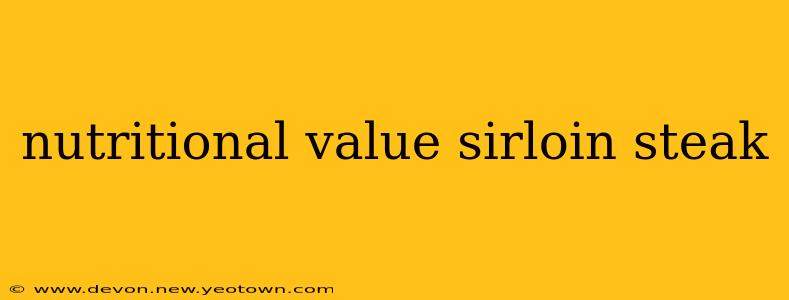Sirloin steak. The name conjures images of sizzling grills, juicy cuts, and a satisfying meal. But beyond its deliciousness lies a nutritional profile packed with benefits. This isn't just a tasty treat; it's a significant contributor to a healthy diet when consumed responsibly. Let's explore the nutritional value of sirloin steak, uncovering its strengths and addressing common concerns.
What are the Nutritional Benefits of Sirloin Steak?
Sirloin steak is a lean cut of beef, meaning it's lower in fat compared to other cuts like ribeye or short rib. This leanness translates directly to several nutritional advantages. Imagine this: you’re fueling your body with high-quality protein, essential vitamins, and minerals, all in one delicious package.
One 3-ounce serving of sirloin steak offers a powerhouse of nutrients. It's a fantastic source of protein, crucial for building and repairing tissues, supporting immune function, and keeping you feeling full and satisfied. This protein is a complete protein, meaning it contains all nine essential amino acids your body can't produce on its own.
Beyond protein, sirloin steak provides essential vitamins and minerals. We're talking about iron, vital for red blood cell production and preventing anemia; zinc, important for immune function and wound healing; vitamin B12, essential for nerve function and red blood cell formation; and niacin, crucial for energy metabolism.
Think of it as a natural multivitamin – but way tastier!
How Much Fat is in Sirloin Steak?
This is a common concern, and rightfully so. While sirloin is a leaner cut, the fat content can vary depending on the specific type of sirloin (top sirloin, bottom sirloin) and the preparation method. Generally, a 3-ounce serving of lean sirloin contains around 4-8 grams of fat. However, it's crucial to remember that not all fat is bad. Sirloin steak contains a mix of saturated and unsaturated fats, with the latter being beneficial for heart health. The key is moderation.
Is Sirloin Steak Good for Weight Loss?
Absolutely, within a balanced diet. The high protein content in sirloin steak contributes to satiety, helping you feel fuller for longer and potentially reducing overall calorie intake. This can be advantageous for weight management. Remember, combining lean protein sources like sirloin with plenty of fruits, vegetables, and whole grains is key for successful and sustainable weight loss. Don't rely solely on sirloin; it's one piece of a larger puzzle.
What are the potential downsides of eating sirloin steak?
While sirloin steak offers many nutritional benefits, it's important to acknowledge potential downsides. Overconsumption of red meat has been linked to an increased risk of certain health problems. The high saturated fat content, while not exceptionally high in sirloin, can contribute to high cholesterol if consumed excessively. Also, the preparation method significantly impacts the nutritional profile; grilling with excessive amounts of oil or butter will drastically increase the fat content. Everything in moderation is the key!
What are the best ways to prepare sirloin steak?
To maximize the nutritional benefits and minimize the potential downsides, opt for healthier cooking methods such as grilling, broiling, or pan-searing with minimal added oil or butter. Avoid deep-frying, which significantly increases the fat and calorie content. Seasoning with herbs and spices is a delicious way to enhance the flavor without adding extra calories or unhealthy fats.
How does sirloin steak compare to other meats?
Compared to other cuts of beef, sirloin is generally considered a leaner option. However, it's worth comparing it to other protein sources like chicken breast or fish. Chicken breast offers similar protein levels with lower fat and saturated fat. Fish provides valuable omega-3 fatty acids, which are beneficial for heart health. The best choice ultimately depends on individual dietary needs and preferences. Diversifying your protein sources is always a smart approach.
In conclusion, sirloin steak offers a significant nutritional package, rich in protein, iron, and other essential vitamins and minerals. However, responsible consumption is crucial. By incorporating it into a balanced diet and choosing healthy cooking methods, you can enjoy the deliciousness and nutritional benefits of this lean cut of beef. Remember to always consult with a healthcare professional or registered dietitian for personalized dietary advice.

